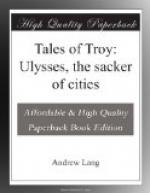From the walls the Trojans saw the black smoke go up thick into the sky, and the whole fleet of the Greeks sailing out to sea. Never were men so glad, and they armed themselves for fear of an ambush, and went cautiously, sending forth scouts in front of them, down to the seashore. Here they found the huts burned down and the camp deserted, and some of the scouts also caught Sinon, who had hid himself in a place where he was likely to be found. They rushed on him with fierce cries, and bound his hands with a rope, and kicked and dragged him along to the place where Priam and the princes were wondering at the great horse of tree. Sinon looked round upon them, while some were saying that he ought to be tortured with fire to make him tell all the truth about the horse. The chiefs in the horse must have trembled for fear lest torture should wring the truth out of Sinon, for then the Trojans would simply burn the machine and them within it.
But Sinon said: “Miserable man that I am, whom the Greeks hate and the Trojans are eager to slay!” When the Trojans heard that the Greeks hated him, they were curious, and asked who he was, and how he came to be there. “I will tell you all, oh King!” he answered Priam. “I was a friend and squire of an unhappy chief, Palamedes, whom the wicked Ulysses hated and slew secretly one day, when he found him alone, fishing in the sea. I was angry, and in my folly I did not hide my anger, and my words came to the ears of Ulysses. From that hour he sought occasion to slay me. Then Calchas—” here he stopped, saying: “But why tell a long tale? If you hate all Greeks alike, then slay me; this is what Agamemnon and Ulysses desire; Menelaus would thank you for my head.”
The Trojans were now more curious than before. They bade him go on, and he said that the Greeks had consulted an Oracle, which advised them to sacrifice one of their army to appease the anger of the Gods and gain a fair wind homewards. “But who was to be sacrificed? They asked Calchas, who for fifteen days refused to speak. At last, being bribed by Ulysses, he pointed to me, Sinon, and said that I must be the victim. I was bound and kept in prison, while they built their great horse as a present for Pallas Athene the Goddess. They made it so large that you Trojans might never be able to drag it into your city; while, if you destroyed it, the Goddess might turn her anger against you. And now they have gone home to bring back the image that fell from heaven, which they had sent to Greece, and to restore it to the Temple of Pallas Athene, when they have taken your town, for the Goddess is angry with them for that theft of Ulysses.”
The Trojans were foolish enough to believe the story of Sinon, and they pitied him and unbound his hands. Then they tied ropes to the wooden horse, and laid rollers in front of it, like men launching a ship, and they all took turns to drag the horse up to the Scaean gate. Children and women put their hands to the ropes and hauled, and with shouts and dances, and hymns they toiled, till about nightfall the horse stood in the courtyard of the inmost castle.




